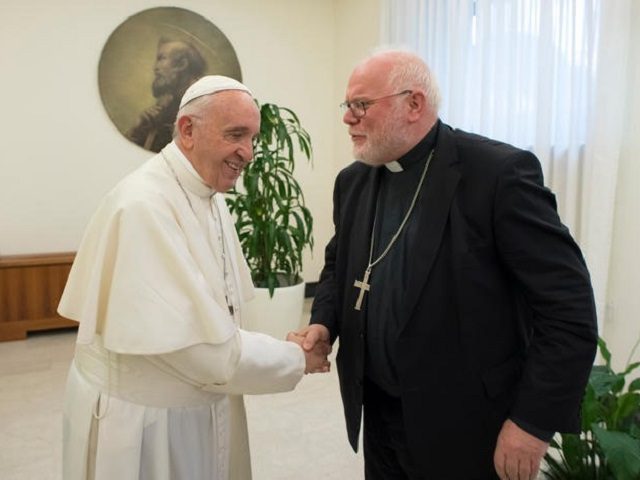In launching an international Vatican conference on the future of Europe on Friday, German Cardinal Reinhard Marx listed off his idea of the three greatest challenges facing Europe, the first of which was “climate change.”
“The European Union and all of Europe find themselves facing great challenges,” the Cardinal said at a press conference Friday morning, “for which citizens expect, if not conclusive answers, at least clear objectives and prospects from their politicians and from politics.”
The Vatican forum titled “(Re)thinking Europe: A Christian contribution to the future of the European Project” is billed as “a high level dialogue between Church and political actors” and is co-organized by the Commission of the Bishops’ Conferences of the European Community (COMECE) and the Holy See.
As the first of the three challenges on his list, Marx named: “Climate change and the attendant need to change our unsustainable lifestyle in the mid-term. United to this is the problem of the costs of ecological change and their distribution.”
The other two great challenges, Marx declared, are “changes in the world of work” such as digitalization and robotics, and Europe’s migrant crisis.
In placing “climate change” as the number-one problem facing Europe, Cardinal Marx was echoing the general sentiment of the German people. A study published last August found that “climate change” was the major concern of more than 70 percent of Germans, while less than half of those polled ranked mass migration as a cause for anxiety.
Curiously, in his analysis the prelate made no mention of the deep crisis in the German Catholic Church, which has been hemorrhaging members over the past 20 years.
As Breitbart News reported last August, the progressive Catholic Church in Germany lost an additional 160,000 members in 2016, and 537 parishes were closed down. Since 1996, the Catholic population in Germany has shrunk from 27,533,000 to 23,582,000—a decline of over 14 percent.
The situation of the German Church is so problematic that in 2015 Pope Francis cited statistic after statistic before a group of German bishops, asking why the Church in Germany is in freefall.
Citing “a drastic drop in Sunday Mass attendance” and in the whole of Catholic sacramental life in Germany, especially in traditionally Catholic areas, the Pope wondered aloud what was going on in Germany.
“Whereas in the 1960s wherever you went almost every Catholic participated in Sunday Mass,” he said, “nowadays it’s often less than ten percent. Fewer and fewer receive the sacraments and the Sacrament of Penance [confession] has all but disappeared.”
“Fewer and fewer Catholics receive the Sacrament of Confirmation or get married in church,” he added, “and the number of vocations to the priesthood and consecrated life is severely diminished.”
Regarding climate change, Chancellor Angela Merkel had successfully positioned Germany as an international climate leader with her ambitious “Energiewende” (energy transition) program, which moves the country away from fossil fuels toward renewable, clean energy. The program also included the elimination of nuclear power by the year 2022.
A comprehensive study published in Energy Policy in 2013, criticized the program, however, declaring that the phasing out of Germany’s nuclear reactors is contradictory to the goal of the climate portion of the program, since nuclear is currently one of the cleanest and least expensive forms of energy available.
Moreover, Energiewende has doubled electricity prices, which many analysts believe contributed to Merkel’s poor showing in last month’s national elections. Costs of the program now total some €650 billion, a bill that weighs heavily on the shoulders of German taxpayers.
Despite its gusto for anti-climate change regulations, Germany has now fallen “hopelessly behind in meeting its carbon targets,” according to reports.
Late last year, the Germans had to be bailed out of a small energy crisis by Poland when the wind stopped blowing for several days and a thick fog covered many parts of Germany, which drove the output from renewables to just 4 percent of total demand.
It was coal-fueled Poland that had to rescue Germany from its self-induced energy crisis.
Follow Thomas D. Williams on Twitter Follow @tdwilliamsrome

COMMENTS
Please let us know if you're having issues with commenting.